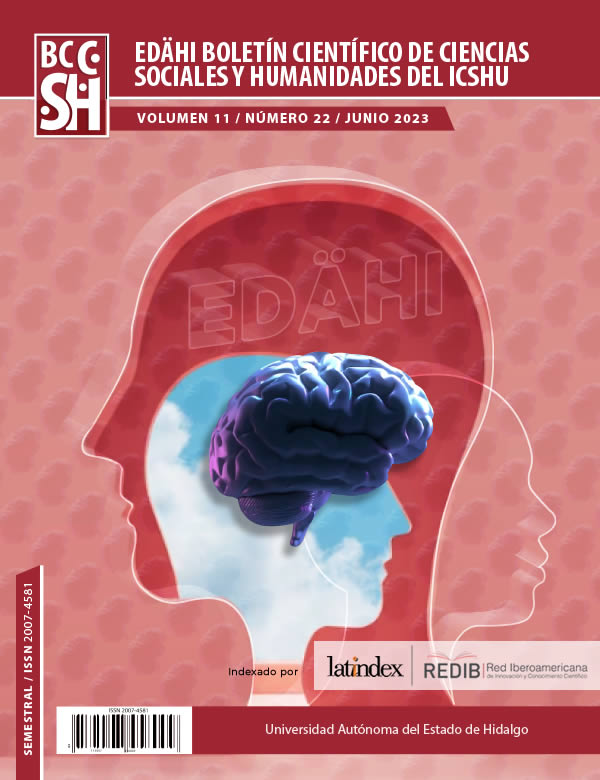Emotions and virtual pedagogy of university teachers in the face of the COVID-19 pandemic
DOI:
https://doi.org/10.29057/icshu.v11i22.10484Keywords:
Teacher training, emotions, Covid-19, distance education, higher educationAbstract
The year 2020 was for Mexico -as for the entire world, a year of sudden changes result of the Covid-19 pandemic. Considering that this virus has the potential to duplicate or triplicate the number of infected people, educational institutions had to transfer from in-situ to online classes to control the spread of the virus. This transition generated a change on the emotions of both teachers and learners. In addition to their methodology, teachers had to face the challenges of dealing with other issues that came along to teaching online, such as their emotions. Wargadinata et al. (2020) suggests that any limitation regarding connectivity and use of technology can have a negative impact in our emotions.
Based on a mixed methods design, this study aimed to explore and identify the feelings and perceptions of professors at the Autonomous University of Quintana Roo at the burst of the pandemic with regards their transition to online teaching. How did participants deal with this new teaching situation, the psycho-pedagogical resources they had, infrastructure, equipment and connectivity were the enquiries that guided the herein study. Data obtained provides evidence on participants’ specific needs regarding infrastructure, emotional support, and professional training on how to deal with health emergencies like the one brought by the pandemic.
Downloads
References
Arizmendi, Silvia; Gillings, Barbara Scholes & López, Cecilio (2016). How novice EFL teachers regulate their negative emotions. HOW, 23 (1), 30–48. Disponible en: https://doi.org/10.19183/how.23.1.299
Asociación Nacional de Universidades e Instituciones de Educación Superior. (2020). Sugerencias para mantener los servicios educativos curriculares durante la etapa de emergencia sanitaria provocada por el COVID-19. ANUIES. Disponible en: http://www.anuies.mx/media/docs/avisos/pdf/200417111353Sugerencias+para+mantener+los+servicios+educativos.pdf
Aspelin, Jonas (2019). Enhancing pre-service teachers’ socio-emotional competence. International Journal of Emotional Education, Special Issue, 11, (1), 153–168.
Bahman, Shahnaz & Maffini, Helen (2008). Developing children’s emotional intelligence. Bloomsbury Publishing.
Belden, M., De la Calle, J. R., Ana Martinez Parente, A., & Vieyra Molina, A. (2020). The impact of the COVID-19 pandemic on higher education in Mexico, Colombia and Peru. United Kingdom; EY-Parthenon Education.
Coady, Maria, López, Mark, Marichal, Nidza & Heffington, Deon (2019). Preparing teacher leaders for rural English language learners. Theory and Practice in Rural Education, 9 (1), 44–60.
Corbin, Juliet & Strauss, Anselm (2007). Basics of qualitative research: Techniques and procedures for developing grounded theory (3rd ed.). SAGE Publications.
Corcoran, Roisin & Tormey, Roland (2012). How emotionally intelligent are pre-service teachers? Teaching and Teacher Education, 28(5), 750–759.
Corcoran, Roisin & Tormey, Roland (2013). Does emotional intelligence predict student teachers’ performance? Teaching and Teacher Education, 35, 34-42.
Cozolino, Louis (2013). The social neuroscience of education: Optimizing attchment and learning in the classroom. W. W. Norton & Company.
Creswell, John (2012). Qualitative Inquiry & Research Design Choosing Among Five Approaches (3rd ed.). SAGE Publications Inc.
Day, Christopher & Gu, Qing (2010). The new lives of teachers. Abingdon: Routledge.
Doley, Nina & Leshem, Shosh (2016). Teachers’ emotional intelligence: the impact of training. The International Journal of Emotional Education, Special Issue, 8 (1), 75–94.
Frenzel, Anne & Stephens, Elizabeth (2013). Emotions. In Emotion, motivation and self-regulation: A handbook for teachers (pp. 1–56). Emerald.
Gardner, Howard (1983). Frames of Mind: The Theory of Multiple Intelligences. Basic Books.
Gkonou, Christina & Mercer, Sarah (2017). Understanding Emotional and Social Intelligence among English Language Teachers. British Council.
Goleman, Daniel (1995). Emotional Intelligence: Why it can matter more that IQ? Bantam Books.
Goleman, Daniel (1998). Working with emotional intelligence. Bantam Books.
Golombek, Paula (1998). A Study of Language Teachers’ Personal Practical Knowledge. TESOL Quarterly, 32 (3), 447–464. Disponible en: https://doi.org/10.2307/3588117
Guerrero, Iran Guadalupe (2020). Reflexiones desde la docencia a distancia ante las demandas educativas originadas por el Covid-19. Educación Futura. Disponible en: https://www.educacionfutura.org/reflexiones-desde-la-docencia-a-distancia-ante-las-demandas-educativas-originadas-por-el-covid-19/ .
Jennings, Patricia & Greenberg, Mark (2009). The prosocial classroom: Teacher social and emotional competence in relation to student and classroom outcomes. Review of Educational Research, 79 (1), 491–525. Disponible en: https://doi.org/10.3102/0034654308325693
Méndez, Mariza Guadalupe (2020). Emotions attributions of pre-service teachers and their effects on teaching practice. Profile: Issues in Teachers’ Professional Development, 22 (1), 15-28. Disponible en: https://doi.org/10.15446/profile.v22n1.78613
Mercer, Sarah & Gkonou, Christina (2017). Teaching with Heart and Soul. Educational Linguistics, 30, 103–124. Disponible en: https://doi.org/10.1007/978-3-319-51789-6_6
Nightengale, Laura (2020). Superspreaders: These factors affect how fast Covid-19 can spread. OSF HealthCare Blog. Disponible en: https://www.osfhealthcare.org/blog/superspreaders-these-factors-affect-how-fast-covid-19-can-spread/
Nizielski, Sophia, Hallum, Suhair; Lopes, Paulo & Schütz, Astrid (2012). Attention to Student Needs Mediates the Relationship Between Teacher Emotional Intelligence and Student Misconduct in the Classroom. Journal of Psychoeducational Assessment, 30 (4), 320–329.
Organización Mundial de Salud. (2020). Brote de enfermedad por coronavirus (COVID-19). Organización Mundial de La Salud. Disponible en: https://www.who.int/es/emergencies/diseases/novel-coronavirus-2019
Powell, William & Kusuma-Powell, Ochan (2010). Becoming an emotionally intelligent teacher. Corwin.
Quiroa, Lourdes (2021). Impact on Mexico's online education and remote learning. Monitoring COVID-19 in Latin America and the Caribbean. https://lawlibrariansmonitoringcovid19.com/2021/03/03/impact-on-mexicos-online-education-and-remote-learning/
Ramana, Turney (2013). Emotional Intelligence and teacher effectiveness- an analysis. Voice of Research, 2 (2),19–22.
Rodríguez-Segura, Leticia, Zamora-Antuñano, Marco Antonio; Rodríguez-Reséndiz, Juvenal; Paredes-García, Wilfrido; Altamirano-Corro, José Antonio & Cruz-Pérez, Miguel Ángel (2020). Teaching challenges in covid-19 scenery: Teams platform-based student satisfaction approach. Sustainability, 12 (18), 7514. Disponible en: https://doi.org/10.3390/su12187514
Saborío Morales, Lachiner & Hidalgo Murillo, Luis Fernando (2015). Síndrome de Burnout. Medicina Legal de Costa Rica, 32 (1). Disponible en: https://doi.org/10.1111/j.1744-7348.1982.tb00824.x
Tsang, Kwok Kuen (2011). Emotional labor of teaching. Educational Research, 2 (8), 1312–1316.
Underhill, Adrian (2013). The Inner Workbench: Learning itself as a meaningful activity. In J. Arnold & T. Murphey (Eds.), Meaningful action: Earl Stevick’s influence on language teaching (pp. 202–218). Cambridge: Cambridge University Press.
UNESCO IESALC (2020). Disponible en: https://www.iesalc.unesco.org/wp-content/uploads/2021/01/AC-36.-2020.pdf
Varea, Valeria & González-Calvo, Gustavo (2021). Touchless classes and absent bodies: teaching physical education in times of Covid-19. Sport, Education and Society, 1–15. Disponible en: https://doi.org/10.1080/13573322.2020.1791814
Wargadinata, Wildana; Maimunah, Iffat; Dewi, Eva & Rofiq, Zainur (2020). Student’s responses on learning in the early COVID-19 pandemic. Journal of Education and Teacher Training, 5 (1), 141–153.




















